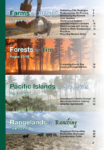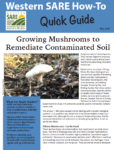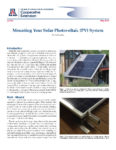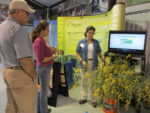Showing 1-7 of 7 results

Adapting to a Changing Climate
Western SARE has released our 28-page publication, Adapting to a Changing Climate: How Western SARE is Meeting the Needs of a Warming West.

Growing Mushrooms to Remediate Contaminated Soil
Mushrooms can bio-remediate certain contaminated soils, although it's not a simple or foolproof process. But for someone interested in mushrooms or already growing them, it can be work the effort.
2018 Annual Report and Impacts
In 2018, Western SARE provided nearly $4 million in funding to projects in the region. These included Research & Education, Professional + Producer, Professional Development, Farmer/Rancher and Graduate Student grants.
2019 Annual Report and Impacts
In 2019, Western SARE provided over $5.6 million in funding to projects in the region. These included Research & Education, Professional + Producer, Professional Development, Farmer/Rancher, Research to Grassroots, and Graduate Student grants.
2020 Annual Report and Impacts
In 2020, Western SARE provided over $6.1 million in funding to projects in the region. These included Research & Education, Professional + Producer, Professional Development, Farmer/Rancher, Research to Grassroots, and Graduate Student grants.

Solar Energy Training Program
Fact sheets/bulletins on the fundamentals of solar photovoltaic energy systems.

A Sunn Hemp Cover Crop for Soil Health and Nematode Management
These University of Hawaii fact sheets and virtual field day explain how to use sunn hemp as a cover crop to control weeds, nematodes and other pests, add soil nutrients, prevent erosion, and contribute to a more robust and complex community of beneficial nematodes. Available fact sheets include: